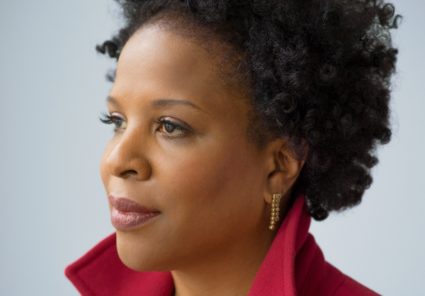
Valentino Garavani, the iconic Italian designer known for his glamorous gowns and signature “Valentino red,” has died at 93.

Our May 2020 pick for the PBS NewsHour-New York Times book club is Ann Petry's "The Street." Become a member of the Now Read This book club by joining our Facebook group, or by signing up to our newsletter. Learn more about the book club here.
When writer Tayari Jones first discovered Ann Petry's "The Street" as a college student, the sober cover art seemed to suggest it was an "Important Book with Serious Themes," she recalls. But then she saw that her friend had a different copy, promising "sex and violence on the mean streets of Harlem."
"My friend's copy made me eager to crack open the book; I felt like we were somehow subverting our professor's lofty goals for us as English majors," Jones told the PBS NewsHour.
But judging the book by both of its covers sold Petry's novel short; Jones discovered its "gorgeous writing" and the "complex analyses of race, gender and poverty" contained within. It has stayed at the top of her list of unsung American works of literature ever since.
Jones, who is the author of "An American Marriage" and several other novels, writes with a typewriter and keeps a couple of pens filled at her desk most of the time. She shares more on her writing routine, as well as the books she's drawn inspiration from over the years, below.
Before bed, I clean my desk and set up my space for a productive day. I make sure that my typewriter has enough ribbon, and I fill two or three fountain pens. Lastly, I put water in the coffee maker. Each morning at 5:15 a.m., I write a personal letter, sometimes two. After that I look at the writing I have done the previous day and select the best sentence and write it on the top of a new sheet of paper, and begin to type.
When I was a little kid, I was totally smitten with "Charlotte's Web," as I identified so closely with Wilbur. Whenever I was anxious, I would recite the words that wise Charlotte used to encourage Wilbur (and save his life). Some Pig! Terrific! Radiant! Humble! I would recite them as a mantra.
But as I got a little older, I read "Roll of Thunder, Hear My Cry" by Mildred Taylor. It is a coming of age story set against the backdrop of Jim Crow segregation. This story brought a dark history to light in a way that made me want to somehow work toward justice. Taylor didn't condescend to her young readers. There was no sugar-coating. The ending, while not happy, allowed for a ray of hope that would shine upon those who are brave and willing to sacrifice. I finished that novel believing that I, as an 11-year-old girl, could make a difference.
I used to say "The Street" by Ann Petry, but with the recent reissue, I am happy to champion "Bombingham" by Anthony Grooms. Published in 2002, is a domestic drama that looks into the life of an African American family in Birmingham in 1963–the year best remembered for the bombing of the 16th Street Baptist Church. But for the Burke family, this is also the year that Mrs. Burke is diagnosed with cancer. When everyday life, love and sorrows collide with momentous social upheaval, the result is great art.
My mentor, Pearl Cleage, taught me not to think of my life being in competition with my writing, instead I should come to see all the ways that my life enhances my writing. She taught me this when I was complaining that my job, my family, just my life was keeping me from writing every day. And don't people say that a real writer writes every single day? She shrugged. Who wants to read a book written by someone who just sits all day at her desk? You want to read a book by someone who is walking the streets, seeing things and meeting people. Writers are here to help make sense of this complex world in which we live. Everything that keeps you away from your work–be it your job, raising kids, taking care of elders, or whatever–these are things that will feed your work. Your busy life is the source of whatever wisdom or understanding that will make your words worth reading.
I discovered "The Street" when I was a student at Spelman College. I bought my copy from the bookstore, and the cover art was a sober black-and-white photograph that signaled that this was an Important Book with Serious Themes. However, my classmate held a vintage copy that she had swiped from her mother's shelf. On her copy, Lutie is a corseted bombshell and the tagline under the title promised "sex and violence on the mean streets of Harlem." My friend's copy made me eager to crack open the book; I felt like we were somehow subverting our professor's lofty goals for us as English majors. However, the gorgeous writing, intertwined with such complex analyses of race, gender and poverty has kept "The Street" at the top of my list of undersung American masterpieces.
Sustain our coverage of culture, arts and literature.